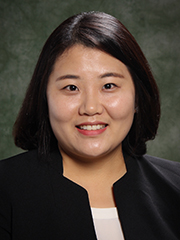Professor researches the effects of child abuse

Dalhee Yoon, assistant professor of social work in the College of Community and Public Affairs (CCPA), has dedicated her career to researching child “maltreatment” (abuse and neglect, as it’s called colloquially) and its effects on adolescent behavior problems, along with relationships children have with their peers.
Her research evaluates various forms of maltreatment (physical, sexual and emotional abuse, and neglect) and connects them to the choices an abused child makes as a teenager.
“I have found that limited research is focused on the types of child abuse and effects of neglect,” said Yoon, who also serves on the CCPA Research Committee.
Yoon’s research shows that abused children are more likely than non-abused children to form unhealthy relationships when they are older.
“Abused youth are more likely to affiliate with deviant peers. Although this association has several practical and research implications, I’m now more passionate about the resilient-based parts,” said Yoon, whose current research is focused on “switching the lens” — looking at data in positive peer relationships. She will analyze positive peer relationships among maltreated youth and how positive peer relationships (e.g., participation in school clubs and sports) buffer the association between traumatic experiences and adolescent behavior problems.
Her study also found that abused children were more likely to engage in high-risk behaviors such as substance abuse or unsafe sexual behaviors as teenagers and were more prone to suffer from mental health issues.
Yoon’s interest in her research was sparked by volunteer experiences in South Korea where she worked with vulnerable children in a runaway youth shelter. Some of the children had run away from home because of family issues while others had run away simply for fun and adventure. Yoon found that children who ran away from home with no evidence of abuse from their guardians were not as likely to engage in high-risk behavior as their counterparts who had run away to escape family abuse. In addition, Yoon explained that the runaway youth who affiliated with deviant peers (people who exhibit problem behaviors such as substance abuse, aggressive behavior, etc.) were more likely to exhibit higher levels of behavior problems compared to those who affiliated with prosocial peers.
“That’s when I started to think about the effect of child maltreatment on adolescent behavior problems and their relationships with their peers,” said Yoon.
She explained the next step is to bridge the gap between research and practice by laying down broad guidelines for social workers.
“I will develop science-based guidelines for interventions. I hope to apply my research to possible peer- or family-based interventions for maltreated kids,” she said.


